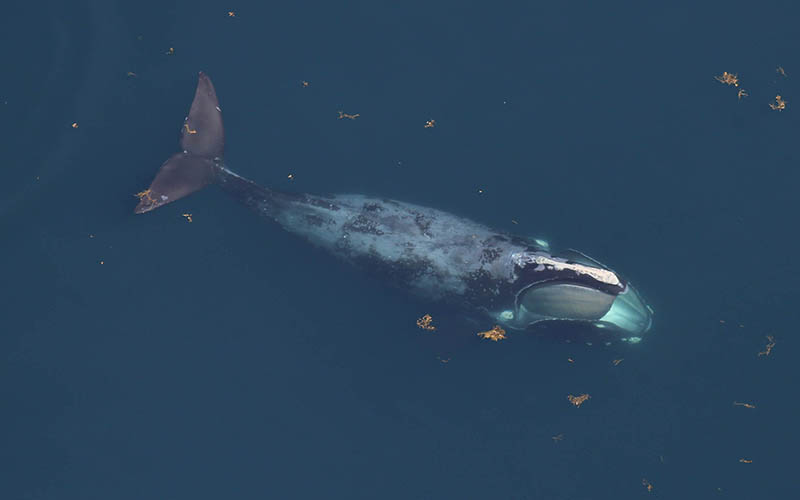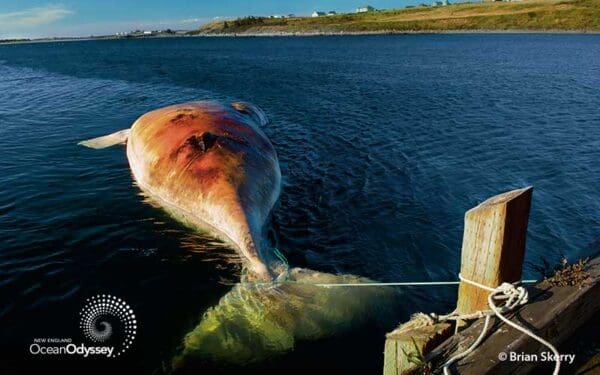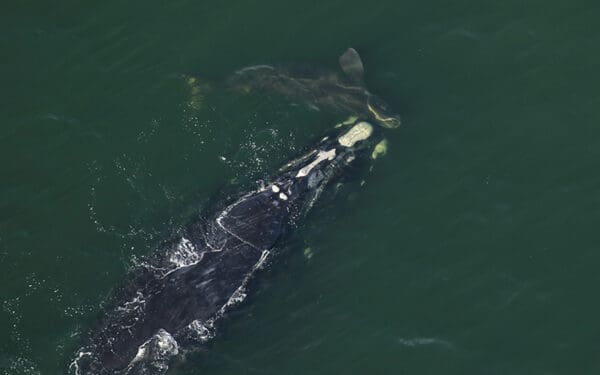
North Atlantic right whales won't face the threat of gillnet fishing gear in areas off of Nantucket following a federal court ruling. Photo: NOAA Fisheries, Northeast Fisheries Science Center
In a major win for endangered North Atlantic right whales, a federal judge ruled that gillnet fishing gear must be removed from 3,000 nautical miles of ocean waters in southern New England. CLF sued the federal government last year for opening up two areas south and east of Nantucket to expanded fishing without considering harm to right whales. Opening these areas put dangerous gear in the middle of a right whale hotspot. It also violated the Endangered Species Act and our federal fisheries law, the Magnuson-Stevens Act.
Federal Judge James Boasberg agreed, ordering federal fishery managers to re-close the areas off of Nantucket to gillnet fishing until they fully complied with the law. His resounding ruling opened with a line from Moby-Dick: “There is no folly of the beasts of the earth which is not infinitely outdone by the madness of men.” Noting that “humans have brought the North Atlantic right whale to the brink of extinction,” Judge Boasberg’s decision is a much-needed step toward recovery.
Federal managers should be protecting right whales, not endangering them
Since 2010, due in large part to climate change, right whales have begun to feed and hang out in new places. One of those new spots lies off of Nantucket, where whales are now found year-round.
Entanglement in fishing gear poses one of the biggest threats to right whales’ survival. Almost every right whale alive has been entangled at least once. Ensuring the species’ survival means we must be more vigilant than ever when considering where to allow commercial fishing, as more gear in the water will up the chances of potentially lethal entanglements.
Despite these clear and dire facts, last year, our federal fishery managers, the National Marine Fisheries Service (NMFS), signed off on a plan to re-open 3,000 miles of right whale habitat to fishing without completing an analysis required by the Endangered Species Act. By law, the branch of NMFS that oversees fisheries must consult with the branch tasked with protecting right whales to ensure fisheries decisions do not harm the endangered whales.
By failing to do this consultation, NMFS put an endangered species at risk – and violated the law. Last week’s federal court ruling ensures that the gear is removed until the required analysis is done.
Gillnet fishing gear harms whales
Gillnet fishing gear, one of the gears that was allowed under the plan CLF took to court, is “one of [right whales’] most dangerous predators,” as Judge Boasberg stated in his decision.
Gillnets – large walls of netting – are designed to trap many fish at once in their mesh. But they trap and harm plenty of other species, too, including turtles, humpback whales, minke whales, and dolphins. When whales get entangled in this mesh wall, they can drown immediately. If they escape death, then the entanglement can cause difficulty feeding, swimming, and, ultimately, reproducing. At least 10 percent of all known right whale entanglements are from gillnet gear, even though it’s a smaller fraction of the fishing gear in their habitat.
Removing gillnet gear from these areas waters (and others) where North Atlantic right whales feed and gather is much-needed protection.
A step in the right direction
Until the federal government does the required analysis, this dangerous fishing gear will have to be removed from these areas. That means that, for now, right whales won’t have to face this deadly threat to their survival. It’s one step of many that must be taken to recover this species, and CLF will continue to fight for their future every step of the way.




